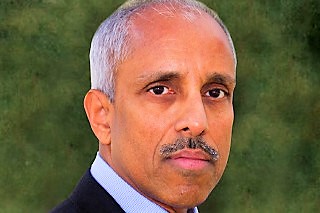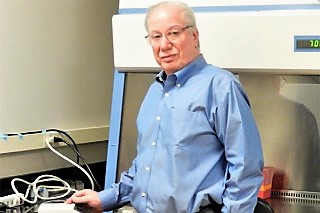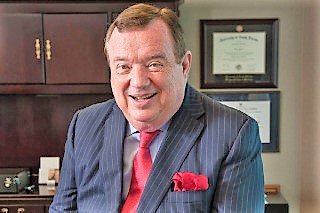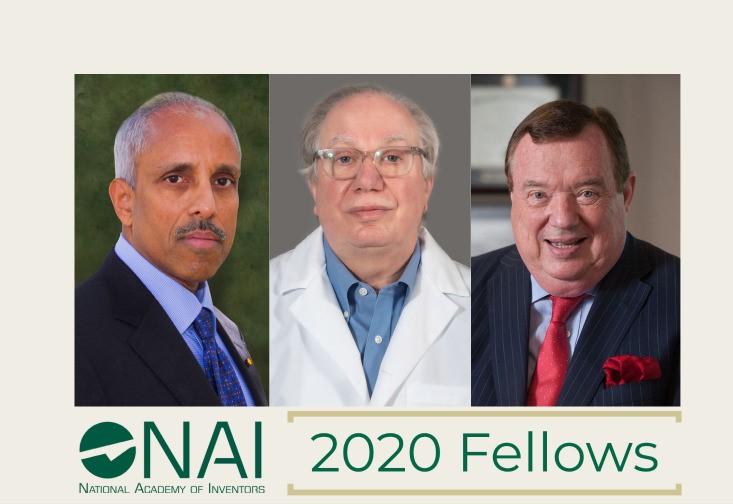As prolific inventors, this year’s faculty honorees developed cutting-edge technology to fight diseases and improve lives.
TAMPA, Fla. – Three University of South Florida faculty members whose career achievements in developing new technologies to improve the well-being of people and the planet have been elected as new Fellows of the National Academy of Inventors.
The honorees are Professors Venkat Bhethanabotla of the College of Engineering; Richard Heller of the Morsani College of Medicine; and Jean-Francois Rossignol, who holds a courtesy faculty appointment in the Morsani College of Medicine’s Division of Infectious Disease & International Medicine.
“I’m so pleased to welcome this year’s class of outstanding NAI Fellows who have shown great dedication, creativity, and perseverance in the advancement of academic technology and innovation,” said Paul R. Sanberg, President of the NAI and USF’s Senior Vice President for Research, Innovation & Knowledge Enterprise. “This year especially, we have seen what a critical role academic research plays in supporting society. I look forward to working collaboratively with the new NAI Fellows in growing a global culture of innovation.”
The USF professors are among 175 academic inventors recognized in the 2020 class of NAI Fellows, the highest professional distinction accorded solely to academic inventors. They will be formally inducted as Fellows at the NAI’s 10th anniversary conference to be held in Tampa in June 2021. USF is the founding home of the NAI.
The 2020 Fellow class represents 115 research universities and governmental and non-profit research institutes worldwide. They collectively hold over 4,700 issued U.S. patents.
Meet the new NAI Fellows from USF:

Professor Venkat Bhethanabotla
Venkat R. Bhethanabotla, PhD
Professor of Chemical & Biomedical Engineering
Bhethanabotla is a pioneering researcher whose discoveries and inventions span acoustic wave and optical biosensors, plasmonic neural stimulation, additive manufacturing, and catalysis for environmental and energy applications. One of his key inventions involves a sensor platform to detect biomarkers of disease in body fluids. He co-developed technologies to convert atmospheric CO2 to high-value, carbon-based products such as fuels. He also identified and developed high-capacity hydrogen storage materials that meet U.S. Department of Energy specifications for practical vehicle applications.
He holds 12 U.S. patents, four of which are licensed or optioned. He is founder of three technology startup companies. He published over 120 articles, books, and chapters; serves as Associate Editor for the IEEE Sensors Journal, and is an editorial board member for the NAI journal Technology & Innovation. Bhethanabotla is a Fellow of the American Institute for Medical and Biological Engineering; the American Association for the Advancement of Science; the American Institute of Chemical Engineers; and is a Senior Member of the Institute of Electrical and Electronics Engineers. He has been a USF faculty member since 1987.

Professor Richard Heller
Richard Heller, PhD
Professor of Medical Engineering
Heller’s pioneering work has provided several foundational breakthroughs in innovative treatments and therapies for many types of cancers, as well as a variety of additional applications. He is recognized as a pioneer in developing efficient delivery systems for plasmid DNA and chemotherapeutics, and is a leading expert in gene electrotransfer. He demonstrated that plasmid DNA can be delivered to a variety of tissue targets including tumors, skin, muscle, the liver, and the heart.
For more than 30 years, his research has focused on evaluating the use of pulse electric fields to manipulate biological cells and tissues, and developing in vivo delivery procedures for non-viral gene transfer for enhancing immunotherapy for cancer treatment.
He is the recipient of the Iwao Yasuda Award from Society for Physical Regulation in Biology and Medicine, Society for In Vitro Biology Distinguished Service Award, Honor B. Fell Award from the Tissue Culture Association, Frank Reidy Award for Outstanding Contribution to the Field of Bioelectrics, Robert J. Grasso Award for Outstanding Dedication to Graduate Education, and holds Eminent Scholar designation from Old Dominion University, among many other awards. Heller is a Fellow in the Society for InVitro Biology; IEEE Senior Member; and is a charter member USF’s NAI Chapter.
He holds 37 U.S. patents, 14 of which have been licensed to four companies. Heller earned his PhD in medical sciences from USF in 1989 and did his post doctoral training here as well. He first joined USF’s faculty in 1990, and after more than a decade away at Old Dominion University he was recruited back to USF in 2019.

Professor Jean-Francois A. Rossignol
Jean-Francois A. Rossignol, PhD, MD
Courtesy Professor, Morsani College of Medicine
Rossignol is a physician, pharmaceutical chemist and a microbiologist who invented
four drugs, including one that is considered by global health experts to be among
the most important medicines to guard against parasitic diseases in developing nations.
In 1974, he discovered a new class of broad-spectrum antiviral drugs. After completing
his medical training, he worked for the Division of Parasitic Diseases at the World
Health Organization and then pursued a career in academia and pharmaceuticals, discovering
and developing drugs such as halofantrine for the treatment of resistant falciparum
malaria as well as inventing albendazole and nitazoxanide to treat intestinal protozoan
and helminthic infections. Both drugs are listed on the WHO Model List of Essential
Medicines and albendazole is among the most widely used drugs in the world. Another
of his drug discoveries, thiazolide aminoxanide, is being developed for the treatment
of viral respiratory infections caused by the five classes of viruses infecting the
respiratory tract including influenza A and B as Quilick®. The drug also is effective
against the three mosquito-borne viruses – Zika, Chikungunya and Dengue - which are
endemic in many parts of the world.
Rossignol is the co-founder of Romark Laboratories, LLC, based in Tampa. He holds 41 U.S. patents and is a fellow of the College of Physicians of Philadelphia. Rossignol also is the recipient of many awards, including the SGS Life Science Life Achievement in Drug Discovery Award, and has had his name engraved on the Wall of Honour of the Royal Society of Medicine in London. In 2016, he received an honorary MD from USF and earlier this year was selected as a new inductee to the Florida Inventors Hall of Fame.
The complete list of NAI Fellows is available here.
About the University of South Florida
The University of South Florida is a high-impact global research university dedicated
to student success. Over the past 10 years, no other public university in the country
has risen faster in U.S. News and World Report’s national university rankings than
USF. Serving more than 50,000 students on campuses in Tampa, St. Petersburg and Sarasota-Manatee,
USF is designated as a Preeminent State Research University by the Florida Board of
Governors, placing it in the most elite category among the state’s 12 public universities.
USF has earned widespread national recognition for its success graduating under-represented
minority and limited-income students at rates equal to or higher than white and higher
income students. USF is a member of the American Athletic Conference. Learn more at
www.usf.edu.
About the National Academy of Inventors
The National Academy of Inventors is a member organization comprising U.S. and international
universities, and governmental and non-profit research institutes, with over 4,000
individual inventor members and Fellows spanning more than 250 institutions worldwide.
It was founded in 2010 to recognize and encourage inventors with patents issued from
the United States Patent and Trademark Office (USPTO), enhance the visibility of academic
technology and innovation, encourage the disclosure of intellectual property, educate
and mentor innovative students, and translate the inventions of its members to benefit
society. The NAI has a close collaborative relationship with the USPTO and is one
of three honorific organizations, along with the National Medals and National Inventors
Hall of Fame, working closely with the USPTO on many discovery and innovation support
initiatives. The NAI publishes the multidisciplinary journal, Technology and Innovation.
www.academyofinventors.org
